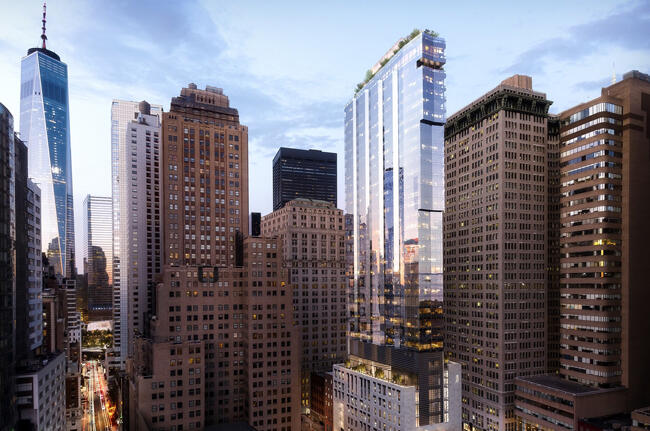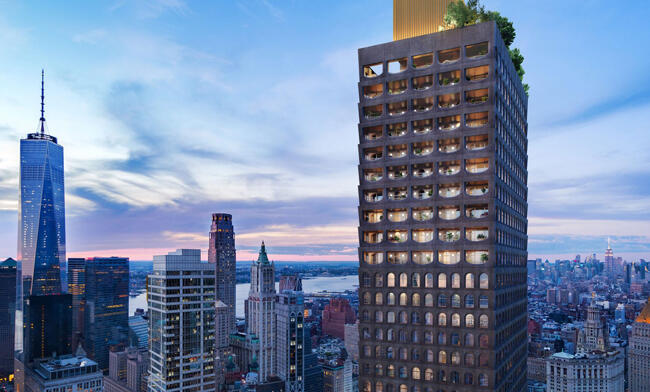Stan Ponte sat across the kitchen table from two Upper East Siders preparing to join the empty nest club in style. The three sipped wine as the couple told Ponte, a Sotheby’s International Realty veteran, the history of their home.
Years earlier, they’d expanded into a neighboring apartment, creating space for a playroom. Their terrace was a treasured outdoor retreat for them and their two dogs. Now that their kids were moving out, the couple was thinking of flying the coop themselves or remodeling. Either way, they were ready for something big. And one factor was driving that.
With Wall Street profits and compensation packages soaring to their highest level in a decade, the couple was expecting a major bonus. They could expand again or join the wave of middle-aged buyers Ponte has seen ditching the Uppers and the burbs for more happening digs Downtown.
“That’s a $20 million dream,” Ponte said. “But if you’re one of the individuals receiving one of these bonuses, that dream is a reality.”
Wall Street’s top six banks made $192.8 billion before taxes last year, more than double the $95.3 billion they earned in 2020, according to the New York state comptroller’s office. Pay at those firms rose almost 12 percent while staffing levels increased just 1 percent.
Bonuses, which routinely exceed 100 percent of bankers’ salaries, probably rose by 15 percent or more from last year, according to Alan Johnson of Johnson Associates, a compensation consultancy. In certain areas, like mergers and acquisitions, Johnson estimated bonuses could be up as much as 50 percent. Meanwhile, stock options from prior compensation packages vested far higher than their value when they were awarded, thanks to the bull year.
“A perfect storm of wonderfulness, in terms of compensation,” Johnson said.
While pay climbs to new heights, financial firms are battling for talent. According to an MIT study, the finance sector’s churn rate hit 10 percent last year. Goldman Sachs lost 15 of every 100 workers.

Jolie on Greenwich
As they juggle big profits and a flightier talent pool, banks are raining bonuses on employees in numbers unseen since the Great Recession. Many of the beneficiaries are putting that cash into real estate.
They want bigger. Taller. More natural light. A second home, or a third or fourth. Duplexes, triplexes. Investment properties and dream homes. A happening neighborhood, a good night’s sleep 60 stories up. Now they’ve got the cash to make it happen.
Boatloads of money
Wall Street bonuses aren’t single-handedly driving the luxury housing market. But they have spurred an already wealthy buyer pool to pull the trigger on an upgrade or flex in a bidding war.
“The data suggest bonuses are just one variable in a complex equation,” said John Walkup, co-founder of UrbanDigs, a real estate data firm. Looking at historical bonus and sale price data, Walkup found no indication that bonuses significantly drive up home prices.
Banker upgrades to homes and apartments are taking place in one of the hottest housing markets on record. In the first five weeks of the year, 119 New York homes have sold for $5 million or more, according to data from Serhant. That’s roughly double the total from the same period in 2019, and the second-strongest start in a decade. The median price for the homes was $8 million, the highest on record.
“There’s so little inventory that people are doing anything they can to win the bid. Waiving inspections, paying cash, closing late, closing early,” said Christine Poppy, a Compass agent in Connecticut’s Fairfield County, which includes Wall Street bastions Darien and Westport.
Money is coming from every direction, not just the financial sector. Crypto billionaires are warping the highest echelons of the market, while tech companies and venture capital firms fan out across the country, allowing workers to settle in high-priced cities not in the Bay Area.
“In the past, Wall Street led the charge for very wealthy purchases. Now you have all sorts of different people with boatloads of money,” said Poppy.
The ballooning of bonuses, diversity of buyers and dearth of product has finally put developers back in the driver’s seat after a years-long glut of new, luxury apartments. Not only has the market more than recovered from pandemic discounts, but developers see the higher prices enduring.
“It’s been consistently crazy busy long enough,” said Noble Black, a Douglas Elliman agent who also advises developers on new condo sales. “Developers are very emboldened in a way that they certainly were not two years ago.”

In one recent sponsor-unit sale, Black brought in a buyer whose offer well exceeded the developer’s minimum price. To the agent’s surprise, the developer demanded the buyer cover more of the closing costs. The deal fell through.
No city is as popular with bankers as New York. Half of the city’s residents worth $30 million or more work in finance, compared to 39 percent in London and 38 percent in Hong Kong, according to research firm Wealth-X. More than 180,000 New Yorkers have $5 million or more in assets. And they all need a place (or two) to live.
Trading up
Luxury real estate agents love spring. High-end sales almost always peak as New York’s weather starts to warm, according to data from Olshan Realty. The trend holds in many markets around the country, as families time their moves to be settled in for the next school year. But in New York, bonuses hit bank accounts in the spring as well, driving buying to yearly heights.
“Year after year, Wall Street bonuses kick the market into full gear,” said Dan Cordeiro, a broker at Corcoran Sunshine Marketing Group. After stocks climbed to all-time highs last year, “it’s no coincidence that 2021 was the best year in New York City real estate ever.”
Even as the market reels from Russia’s invasion of Ukraine, Cordeiro and other luxury agents in New York are watching Wall Street put the fruits of last year’s labor into real estate.
At 15 and 35 Hudson Yards, where Succession’s Kendall Roy plots hostile takeovers from his 90th-floor penthouse, Cordeiro sold two three-bedroom apartments to people who lived in smaller units in the same building.
“Two years and two bonus cycles later, they want to stay in the building and upgrade,” Cordeiro said. In the past 60 days, he reported three sales over $9 million to finance types who had been renting.
In Chelsea, Cordeiro recently sold two three-bedroom apartments to bankers for about $7 million apiece in Lantern House, Related’s luxury condos with bug-eyed windows overlooking the High Line.
Serhant agent Krista Nickols recently sold an apartment Downtown to a couple who lived in the neighborhood and had been eyeing their new building for some time. “The only thing that changed was it was January — comp season,” Nickols said. “So they bought.”
The bonus gave them the ability to buy immediately. Other potential buyers visited in the fall and wavered.

130 William
For many buyers, this year’s big bonuses were their second in two years. Upgrading apartments on just one outsized check could cause problems because the higher housing expenses are recurring. This second bonus truly puts real estate in play, although buyers don’t necessarily say it.
“It’s not like my client called me and said I just got a huge bonus; let’s up it,” said Lauren Muss, an agent at Douglas Elliman. “You just know that’s why. Bonuses have not been this big in a long time.”
A family affair
This year’s bonuses leave many of their younger recipients anxious to spend like their predecessors. Some need a hand.
Kirk Rundhaug, an agent at Compass, recently sold an apartment on West 21st Street to a 30-year-old banker for $15 million. The buyer brought his mother to the showing.
“Parents are buying apartments for their kids, or the kids are making so much money the parents are trying to guide them,” he said.
Rundhaug has fielded particular interest in One Wall Street, Macklowe Properties’ 1.1-million-square-foot condo development just across New Street from the New York Stock Exchange. Newly liquid buyers include full-time residents and commuters, liberated from a five-day workweek who are seeking pieds-à-terre for the days they actually need to come into the office.
Older finance workers are using bonuses to keep the family close, but not cramped, in what Compass agent Brian Milton calls “grandparent compounds.” Milton has sold these hulking properties, some 10,000 to 15,000 square feet, across Westchester County and Greenwich, Connecticut.
Kobi Lahav, a broker at Living NY, is working with one first-time buyer with a $7 million budget. He’s been renting for years, but now, as a young, single man who suddenly has money to spare, he’s looking for a place he can grow into.
“He wants a show-off apartment,” Lahav said.
Just a few years ago, Lahav sold a Wall Street trader a $2 million apartment. Since then, the trader has had a kid and is thinking about another. Now that he has his bonus, he wants to upgrade to a loft worth between $5 million and $6 million, and is in no rush to sell the current place. He can always rent it, or stay in it and do extensive renovations on the new one.
Buyers’ mentality toward homebuying mirrors their approach to trading securities at work. “You don’t want to buy Amazon when it’s 30 percent up,” Lahav said. “You want to buy it when it’s 20 percent down.”
That mentality has led some Wall Streeters to buy in neighborhoods that previous bank bigwigs would never have stepped a Gucci loafer in. “They’re not just jumping into Soho or the West Village,” says Lahav, who recalled a buyer telling him, “I heard there’s some value in Brooklyn.”
The city’s seven priciest neighborhoods to buy a home are in Manhattan, according to data from PropertyShark. Brooklyn locales grabbed two of the top 10 spots as prices in Dumbo and Red Hook jumped by about 20 percent last year.
The frenzy has even stretched up to Litchfield County, Connecticut, where Compass broker Rich Distel has noticed an increase in finance workers looking to buy.
He estimates that four-fifths of his buyers are New Yorkers seeking second homes, and says the heightened demand has spread inventory wafer-thin. He just listed a four-bedroom colonial homestead in Roxbury, Connecticut, for $5.7 million. The property, made of antique woods and local granite, sits on 450 acres of nature preserve. It’s the type of oasis from the city that Wall Streeters have long sought in the Hamptons and Aspen, but it’s a more reasonable schlep from the city.
“Normally we wouldn’t see too much activity this time of year, but we are showing it regularly and I don’t expect it to be around for long,” Distel said.
Buyers from the financial services industry have also flocked to South Florida, spending millions of dollars on homes and intensifying competition as part of a bigger group of out-of-state buyers. Say what you want about working from home, though: Wall Street isn’t moving anywhere.
“Despite the refugees to Florida, all the people screaming about the taxes, complaining about homelessness,” Olshan said. “Get over it — it’s the greatest city in the world. If you evacuate, there’ll be two people behind you wanting your spot.”
— Katherine Kallergis contributed reporting.
